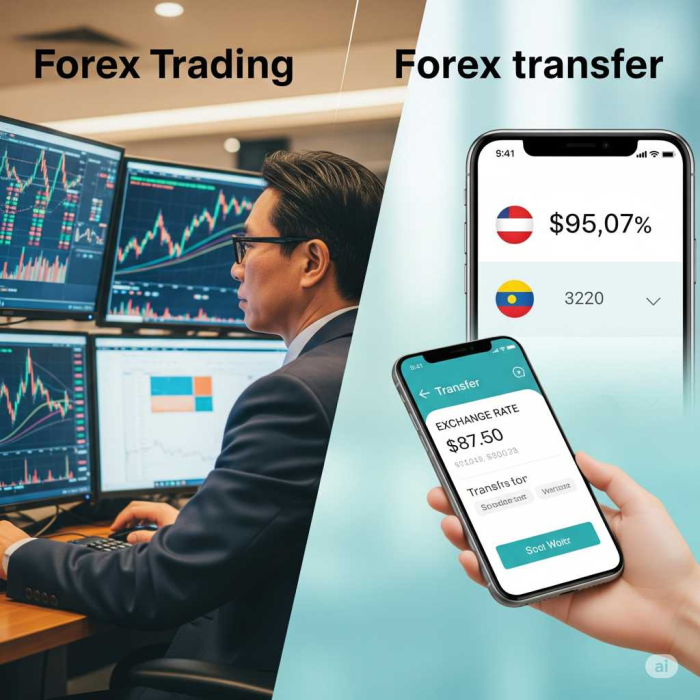Forex Trading vs. Forex Transfers | Not the Same Game!
The world of foreign exchange, often shortened to "Forex" or "FX," can seem like a complex beast. You hear about trillions of dollars changing hands daily, global markets, and opportunities for profit. But it's crucial to understand that not all interactions with foreign currency are created equal. Specifically, "forex trading" and "forex transfers" serve entirely different purposes and carry distinct implications.

Let's clear up the confusion and highlight the core differences between these two important concepts.
What is Forex Trading?
At its heart, forex trading is about speculation. It's the act of buying and selling different currencies with the primary goal of making a profit from the fluctuations in their exchange rates. Think of it like trading stocks, but instead of company shares, you're trading national currencies.
Here's what defines forex trading:
- Objective: To profit from currency price movements. Traders analyze economic data, geopolitical events, and technical charts to predict whether one currency will strengthen or weaken against another.
- Mechanism: Currencies are traded in pairs (e.g., EUR/USD, GBP/JPY). When you "buy" a pair, you're effectively buying the first currency and selling the second, hoping the first currency appreciates in value relative to the second.
- Participants: Individual retail traders, institutional investors, hedge funds, banks, and corporations engaged in active speculation.
- Time Horizon: Can range from seconds (scalping) to days, weeks, or even months (swing trading or position trading).
- Risk & Reward: High potential for both significant profits and substantial losses, especially when using leverage. Leverage magnifies both gains and losses.
- Regulation: Often regulated by financial authorities in various jurisdictions, with brokers requiring licenses.
- No Physical Exchange: Most forex trading happens electronically on an "Over-the-Counter" (OTC) market, meaning there's no central exchange. You don't physically receive or send currency.
In essence, forex trading is an investment activity. You're taking a position on the future value of a currency pair.
What are Forex Transfers (or Money Transfers)?
Forex transfers, on the other hand, are about remittance or payment. They involve the actual exchange of one currency for another for the purpose of sending money from one place to another. This is a practical, transactional service.
Consider these characteristics of forex transfers:
- Objective: To move a specific amount of money from one currency to another for a practical reason. This could be sending money to family abroad, paying for goods or services from an international supplier, or converting travel money.
- Mechanism: You provide one currency, and a service provider (like a bank or a dedicated money transfer company) converts it into another currency at an agreed-upon exchange rate, then sends it to the recipient's bank account or for cash pickup.
- Participants: Individuals sending remittances, businesses paying overseas invoices, tourists exchanging travel money.
- Time Horizon: Typically a one-off transaction, aiming for quick and efficient delivery of funds.
- Risk & Reward: The primary "risk" is typically the exchange rate itself – you want a favorable rate. There's usually no speculative intent or the use of leverage. The "reward" is the successful and cost-effective delivery of the desired amount in the target currency.
- Regulation: Governed by regulations related to money laundering, payment services, and consumer protection.
- Physical Exchange (Implied): While often electronic, the end result is the actual availability of the funds in the foreign currency for use.
In essence, a forex transfer is a service for moving money across borders and currencies.
Key Differences at a Glance:
| Feature | Forex Trading | Forex Transfers |
|---|---|---|
| Primary Goal | Profit from currency price speculation | Exchange and send money for practical purposes |
| Nature | Investment/Speculation | Transactional service |
| Risk Profile | High risk, potential for significant losses | Lower risk (related to exchange rate/fees) |
| Leverage | Commonly used to magnify returns (and losses) | Not applicable |
| Timeframe | Short-term to long-term positions | Typically immediate or short processing time |
| Participants | Traders, institutions, speculators | Individuals, businesses, tourists |
| End Result | Open/closed positions, profit/loss | Funds successfully transferred/received |
Why the Confusion?
The confusion often arises because both activities involve the "foreign exchange" market. When you get a quote for a forex transfer, the rate you receive is derived from the underlying forex market. However, the purpose for engaging with that market is what differentiates trading from transferring.
Conclusion: Know Your Objective!
Understanding the distinction between forex trading and forex transfers is crucial. If your goal is to make money by predicting currency movements, you're looking at forex trading – a venture that requires significant research, risk management, and a deep understanding of market dynamics. If you simply need to send or receive money in a different currency, you're engaging in a forex transfer – a practical financial service focused on efficient and cost-effective remittance.
Always be clear about your objective when dealing with foreign exchange, as this will guide your choices in terms of providers, strategies, and the level of risk you undertake.
Popular Tags